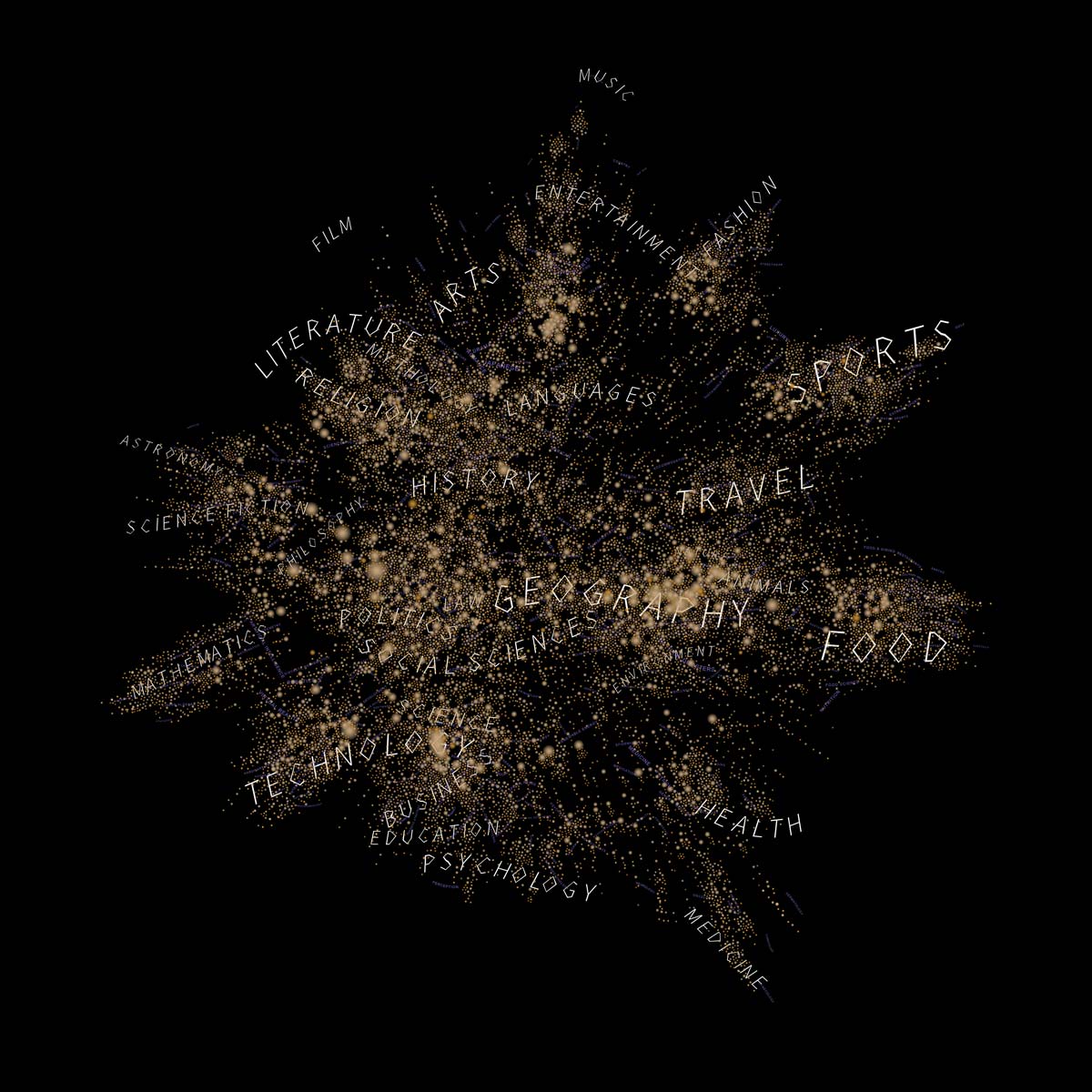
project
01/11/2022 – 11/07/2025
metaLAB (at) Harvard & Berlin
Artificial Worldviews
How will »prompting« change the way we experience the world? Artificial Worldviews inquired GPT-3.5 about its knowledge of the world in 1.764 prompts and mapped out the results. The advent of Large Language Models (LLMs) has revolutionized natural language processing and understanding. Over the past years, these models have achieved remarkable success in various language-related tasks, a feat that was unthinkable before. After its launch, ChatGPT quickly became the fastest-growing app in the history of web applications. But as these systems become common tools for generating content or finding information—from research and business to greeting cards—it is crucial to investigate the worldviews of these systems. Every media revolution changes how humans relate to one another; LLMs will have a vast impact on human communication. How will systems such as ChatGPT influence the ideas, concepts, and writing styles over the next decade? To grasp the situation our research methodically requested data from the underlying API of ChatGPT about its own knowledge. The first prompt is the following: “Create a dataset in table format about the categories of all the knowledge you have.” From this initial prompt, a recursive algorithm requested data about fields of knowledge, their subfields, and the humans, objects, places, and artifacts within these categorical systems. The generated data does not represent an unbiased picture of the knowledge inherent in GPT-3. Instead, it is a confluence of three forces: first, a representation of how the LLM handles the request; second, a perspective on the underlying textual training data; and third, a reflection of the political sets and settings embedded within the artificial neural network. Our research questions are manifold and prompt a deeper inquiry into the nature of artificial intelligence. First, we find ourselves intrigued by the possibility of probing this novel method as a means to understand AI systems. What can we learn from the iterative and methodical requesting of data from large language models? Is it a mirror reflecting our human intellect or an entity with its own inherent logic? Second, we are interested in questions that pertain to the dataset itself: What are the biases of the system? Are there fields that stand overrepresented or underrepresented, and what does that signify about our collective online text corpus? How diverse will the dataset be, and what can that diversity teach us about the breadth and limitations of machine learning?
Relations
work
Professor Film University Babelsberg
Potsdam
work
metaLAB (at) Harvard Principle
Cambridge
work
metaLAB (at) Berlin Director
Berlin
16/12/2025 talk
Abstraction Today: The Real and the Imaginary
Institute of Art History & Department of Media Studies at the University of Bonn, Brandenburg Center for Media Studies (ZeM)
06/11/2025 talk
Keynote IEEE VIS Arts Program 2025
University of Applied Arts Vienna
18/09/2025 talk
Liminale Talk
Hochschule Hannover
11/07/2025 talk
xCoAx Artificial Worldviews Talk 2025
V&A, Dundee, UK
11/07/2025 writing
xCoAx Artificial Worldviews Paper
V&A, Dundee, UK
18/06/2025 media
Harvard Magazine "When Code Meets Canvas"
Harvard Magazine
11/06/2025 exhibition
Harvard CAMLab Exhibition
Harvard University
13/06/2025 talk
Harvard CAMLab Artist Talk: Anti-Data
Harvard University
23/05/2025 talk
Keynote at 5th International Media and Society Symposium "Algorithmic Culture"
İstinye University, Istanbul
22/05/2025 talk
Plattform-Politiken: Vermittlungen (un)sichtbarer Bildpraktiken und Interface-Operationen
Staatliche Hochschule für Gestaltung Karlsruhe
20/03/2025 talk
L'Art des données, les données de l'art
Université Rennes
18/01/2025 exhibition
Artificial Worldviews | | Salon Sophie Charlotte 2025
Berlin-Brandenburgische Akademie der Wissenschaften
18/01/2025 talk
Daten Metamorphosen | | Salon Sophie Charlotte 2025
Berlin-Brandenburgische Akademie der Wissenschaften
28/12/2024 exhibition
Machines as Humans as Machines
Adapter Budapest
24/10/2024 talk
Talk at the Robert Koch Institute
Center for Artificial Intelligence in Public Health Research
08/11/2024 talk
Keynote at Discourses of Capital, Technology, and Artificial Intelligence
DiscourseNet
11/10/2024 talk
Data Wise Talk 2024
University of Groningen
04/06/2024 talk
APIs as media
Brandenburgische Zentrum für Medienwissenschaften
27/09/2024 talk
Debating Design – Harvard Design Engineering Session
Harvard University Graduate School Of Design
20/09/2024 talk
The Art of Living Through System Failure Symposium
Malta Society of Arts
29/02/2024 workshop
Harvard Radcliffe Seminar 2024
Radcliffe Institute for Advanced Study at Harvard University
21/07/2024 workshop
Dagstuhl Seminar 2024
Schloss Dagstuhl – Leibniz Center for Informatics
24/06/2024 talk
ECDF Artificial Worldviews Talk
Einstein Center Digital Future Berlin
11/07/2024 talk
xCoAx Artist Talk 2024
xCoAx, Fabrica, Treviso, Italy
11/07/2024 exhibition
Artificial Worldviews at xCoAx 2024
xCoAx, Fabrica, Treviso, Italy
14/03/2024 talk
metaLAB (at) Basel Launch
Basel, Swiss
07/05/2024 talk
Seminar Visit FU Berlin
Kultur- und Medienmanagement, FU Berlin
23/04/2024 talk
Data as Material for Design Lecture
University of Applied Sciences and Arts of Southern Switzerland
25/04/2024 talk
Man & Machine - Back to Nature with more Artificial Intelligence?
Einstein Center Digital Future, Berlin
04/03/2024 talk
Computing Fantasy Class Harvard
Harvard University
05/03/2024 talk
Talk at Boston City Hall
Boston City Hall
06/03/2024 talk
Network Science Institute Talk 2024
Network Science Institute, Northeastern University
08/02/2024 talk
College of Arts, Media and Design at Northeastern University
Northeastern University
07/02/2024 talk
metaLAB (at) Harvard Artificial Worldviews Talk
metaLAB (at) Harvard
13/12/2023 media
Artificial Worldviews by Harvard Magazine
Harvard Magazine
21/12/2023 media
Nature 10 Cover
Nature Journal
30/11/2023 talk
Keynote MOVE! Ideafest 2023
Filmuniversität Babelsberg Konrad Wolf
19/09/2023 writing
Visualizing ChatGPT’s Worldview
Nightingale Magazine
23/08/2023 media
Se o ChatGPT tivesse cérebro, sua aparência seria mais ou menos assim
FastCompany Brazil
17/08/2023 media
If ChatGPT had a brain, this is what it would look like
FastCompany
17/11/2023 talk
Growing Virtuality Conference
Ruhr-University Bochum